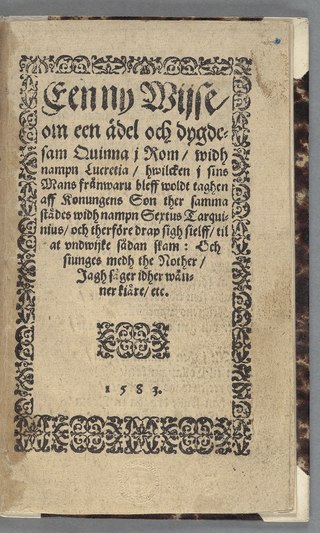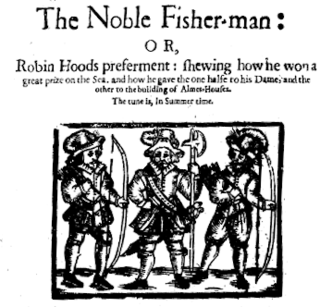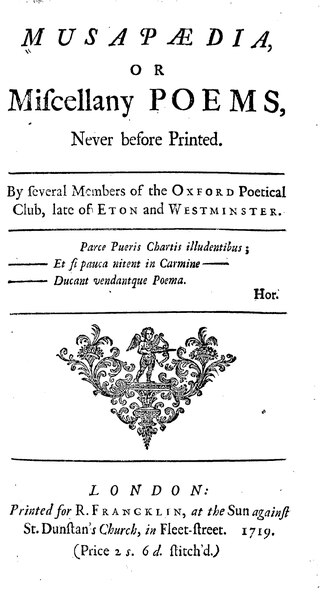Related Research Articles

A ballad is a form of verse, often a narrative set to music. Ballads derive from the medieval French chanson balladée or ballade, which were originally "dance songs". Ballads were particularly characteristic of the popular poetry and song of Britain and Ireland from the Late Middle Ages until the 19th century. They were widely used across Europe, and later in Australia, North Africa, North America and South America.

"Barbara Allen" is a traditional folk song that is popular throughout the English-speaking world and beyond. It tells of how the eponymous character denies a dying man's love, then dies of grief soon after his untimely death.

A chapbook is a type of small printed booklet that was popular medium for street literature throughout early modern Europe. Chapbooks were usually produced cheaply, illustrated with crude woodcuts and printed on a single sheet folded into 8, 12, 16, or 24 pages, sometimes bound with a saddle stitch. Printers provided chapbooks on credit to chapmen, who sold them both from door to door and at markets and fairs, then paying for the stock they sold. The tradition of chapbooks emerged during the 16th century as printed books were becoming affordable, with the medium ultimately reaching its height of popularity during the 17th and 18th centuries. Different ephemera and popular or folk literature were published as chapbooks, such as almanacs, children's literature, folklore, ballads, nursery rhymes, pamphlets, poetry, and political and religious tracts. The term chapbook remains in use by publishers to refer to short, inexpensive booklets.

"Matty Groves", also known as "Little Musgrave and Lady Barnard" or "Little Musgrave", is a ballad probably originating in Northern England that describes an adulterous tryst between a young man and a noblewoman that is ended when the woman's husband discovers and kills them. It is listed as Child ballad number 81 and number 52 in the Roud Folk Song Index. This song exists in many textual variants and has several variant names. The song dates to at least 1613, and under the title Little Musgrave and Lady Barnard is one of the Child ballads collected by 19th-century American scholar Francis James Child.

A broadside is a single sheet of inexpensive paper printed on one side, often with a ballad, rhyme, news and sometimes with woodcut illustrations. They were one of the most common forms of printed material between the sixteenth and nineteenth centuries, particularly in Britain, Ireland and North America because they are easy to produce and are often associated with one of the most important forms of traditional music from these countries, the ballad.

"The Raggle Taggle Gypsy" (Roud 1, Child 200), is a traditional folk song that originated as a Scottish border ballad, and has been popular throughout Britain, Ireland and North America. It concerns a rich lady who runs off to join the gypsies (or one gypsy). Common alternative names are "Gypsy Davy", "The Raggle Taggle Gypsies O", "The Gypsy Laddie(s)", "Black Jack David" (or "Davy") and "Seven Yellow Gypsies".
"Geordie" is an English language folk song concerning the trial of the eponymous hero whose lover pleads for his life. It is listed as Child ballad 209 and Number 90 in the Roud Folk Song Index. The ballad was traditionally sung across the English speaking world, particularly in England, Scotland and North America, and was performed with many different melodies and lyrics. In recent times, popular versions have been performed and recorded by numerous artists and groups in different languages, mostly inspired by Joan Baez's 1962 recording based on a traditional version from Somerset, England.

The Noble Fisherman, also known as Robin Hood's Preferment and Robin Hood's Fishing, is a 17th-century ballad of Robin Hood. Unusually, it depicts Robin Hood as a hero of the sea, rather than his usual portrayal as someone who operated in the greenwood forest. It seems to have been quite popular for the first two centuries of its existence, although it eventually lost prominence and was less used in adaptations of Robin Hood from the 19th and 20th centuries. It was later published by Francis James Child in the 1880s as Child Ballad #148 in his influential collection of popular ballads.
"King John and the Bishop" is an English folk-song dating back at least to the 16th century. It is catalogued in Child Ballads as number 45 and Roud Folk Song Index 302.

"The Cuckoo" is a traditional English folk song, also sung in the United States, Canada, Scotland and Ireland. The song is known by many names, including "The Coo-Coo", "The Coo-Coo Bird", "The Cuckoo Bird", "The Cuckoo Is a Pretty Bird", "The Evening Meeting", "The Unconstant Lover", "Bunclody" and "Going to Georgia". In the United States, the song is sometimes syncretized with the other traditional folk song "Jack of Diamonds". Lyrics usually include the line : "The cuckoo is a pretty bird, she sings as she flies; she brings us glad tidings, and she tells us no lies."
William Turner was a composer and countertenor of the Baroque era. A contemporary of John Blow and Henry Purcell, he is best remembered for his verse anthems, of which over forty survive. As a singer, he was a Gentleman of the Chapel Royal from 1669 until his death.
"Donnelly and Cooper" is an Irish ballad recounting a historic bare-knuckle boxing match between Dan Donnelly and George Cooper.
Hyder Edward Rollins was an American scholar and English professor. He was a prolific author of articles and books on Elizabethan poetry, broadside ballads, and Romantic poets. He was an internationally recognized scholar on John Keats, and he edited the authoritative two-volume edition of Keats' letters.

A miscellany is a collection of various pieces of writing by different authors. Meaning a mixture, medley, or assortment, a miscellany can include pieces on many subjects and in a variety of different forms. In contrast to anthologies, whose aim is to give a selective and canonical view of literature, miscellanies were produced for the entertainment of a contemporary audience and so instead emphasise collectiveness and popularity. Laura Mandell and Rita Raley state:
This last distinction is quite often visible in the basic categorical differences between anthologies on the one hand, and all other types of collections on the other, for it is in the one that we read poems of excellence, the "best of English poetry," and it is in the other that we read poems of interest. Out of the differences between a principle of selection and a principle of collection, then, comes a difference in aesthetic value, which is precisely what is at issue in the debates over the "proper" material for inclusion into the canon.
"The Unfortunate Lad" is the correct title of a song printed without a tune on a number of 19th century ballad sheets by Such of London and Carrots and possibly others.
Neptune's Raging Fury is an English Broadside Ballad. The ballad is told from the perspective of a sailor, who is explaining the perils of sea voyages to those who stay on land. Copies of the broadside can be found at the National Library of Scotland, the British Library, the University of Glasgow Library, and Magdelene College. Online facsimiles of the text are also available.
"When Jones' Ale Was New" is an English folk song about men of various trades drinking at an ale-house or tavern. Other titles include "Joan's Ale is New" and "When Johnson's Ale Was New". Originating in the 16th century CE it has been collected frequently from traditional singers in England, and has been found occasionally in Scotland and the USA. It has evolved over the years, and is popular as a chorus song in folk clubs in England.
The Lark in the Morning is an English folk song. It was moderately popular with traditional singers in England, less so in Scotland, Ireland and the United States. It starts as a hymn to the ploughboy's life, and often goes on to recount a sexual encounter between a ploughboy and a maiden resulting in pregnancy.
The Golden Glove is an English folk song also popular in Scotland, Ireland and North America. It tells the tale of a young woman who falls in love with a farmer and devises a somewhat far-fetched ruse to win his love. This song is also known as Dog and Gun and The Squire of Tamworth
George Thorn-Drury KC (1860–1931) was an English barrister and literary scholar.
References
- 1 2 3 4 5 6 "The Harding Collection". digitalmiscellaniesindex.org.
- 1 2 "Weston Library". www.bodleian.ox.ac.uk.
- 1 2 3 "Twenty Minutes - Ragtime to Riches - BBC Sounds". www.bbc.co.uk.